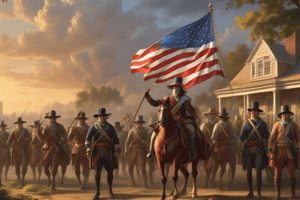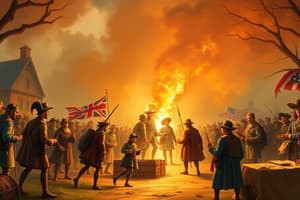Podcast
Questions and Answers
What was the ratio of Britons to colonists at the time of the rebellion?
What was the ratio of Britons to colonists at the time of the rebellion?
- 5 to 1
- 4 to 1
- 3 to 1 (correct)
- 2 to 1
How many Germans, known as Hessians, were ultimately employed by Britain?
How many Germans, known as Hessians, were ultimately employed by Britain?
- 50,000
- 20,000
- 40,000
- 30,000 (correct)
What was the size of Britain's professional army compared to the American militia?
What was the size of Britain's professional army compared to the American militia?
- 50,000 vs numerous but wretchedly trained American militia (correct)
- 100,000 vs well-trained American militia
- 70,000 vs highly skilled American militia
- 30,000 vs poorly equipped American militia
What was the main reason for Britain's weakness despite its apparent strength?
What was the main reason for Britain's weakness despite its apparent strength?
What was the availability of firearms among Colonial Americans?
What was the availability of firearms among Colonial Americans?
What was the cost of an imported musket in the colonies?
What was the cost of an imported musket in the colonies?
Who played a crucial role in training the Continental Army into a disciplined force?
Who played a crucial role in training the Continental Army into a disciplined force?
What was a concern for the colonies leading up to the Revolutionary War?
What was a concern for the colonies leading up to the Revolutionary War?
What was the reliability of American militiamen during the war?
What was the reliability of American militiamen during the war?
What was the attitude of American profiteers towards the Continental Army?
What was the attitude of American profiteers towards the Continental Army?
Which English statesman withdrew his son from the army to prevent him from fighting against American colonists?
Which English statesman withdrew his son from the army to prevent him from fighting against American colonists?
During the prolonged campaign for Bunker Hill, approximately how many American babies were born?
During the prolonged campaign for Bunker Hill, approximately how many American babies were born?
What was a significant challenge faced by the British army in America?
What was a significant challenge faced by the British army in America?
What advantage did the American colonies lack in comparison to Paris?
What advantage did the American colonies lack in comparison to Paris?
Who were some of the outstanding leaders that benefited the Americans during the war?
Who were some of the outstanding leaders that benefited the Americans during the war?
What was a characteristic of the American rebels during the war?
What was a characteristic of the American rebels during the war?
What was General George Washington's attitude towards militia during the war?
What was General George Washington's attitude towards militia during the war?
What were prevalent among the colonists during the war?
What were prevalent among the colonists during the war?
True or false: The British army had about 50,000 men, while the American militia was numerous but poorly trained.
True or false: The British army had about 50,000 men, while the American militia was numerous but poorly trained.
True or false: The British government at the time was efficient and organized.
True or false: The British government at the time was efficient and organized.
True or false: France was looking for an opportunity to support Britain during the Revolutionary War.
True or false: France was looking for an opportunity to support Britain during the Revolutionary War.
True or false: Many Britons had no desire to harm their American cousins during the war.
True or false: Many Britons had no desire to harm their American cousins during the war.
Colonial Americans were well-armed with firearms, with a majority of households owning guns and belonging to local militias.
Colonial Americans were well-armed with firearms, with a majority of households owning guns and belonging to local militias.
No gun factories existed in the colonies, and an imported musket cost the equivalent of two months' salary for a skilled artisan.
No gun factories existed in the colonies, and an imported musket cost the equivalent of two months' salary for a skilled artisan.
General Washington was satisfied with the commitment and supplies of his troops during the war.
General Washington was satisfied with the commitment and supplies of his troops during the war.
American militiamen were highly reliable, well-trained, and steadfast in their posts during the war.
American militiamen were highly reliable, well-trained, and steadfast in their posts during the war.
Baron von Steuben, a German officer, did not play a crucial role in training the Continental Army into a disciplined force.
Baron von Steuben, a German officer, did not play a crucial role in training the Continental Army into a disciplined force.
Blacks fought for only one side in the war, either the British or the Continental Army.
Blacks fought for only one side in the war, either the British or the Continental Army.
Slave uprisings were not a concern for the colonies leading up to the Revolutionary War.
Slave uprisings were not a concern for the colonies leading up to the Revolutionary War.
American profiteers did not undermine morale in the Continental Army by selling supplies to the British for profit.
American profiteers did not undermine morale in the Continental Army by selling supplies to the British for profit.
The Continental Army easily raised enough troops to fight the British with an abundance of willing volunteers.
The Continental Army easily raised enough troops to fight the British with an abundance of willing volunteers.
A majority of colonists were deeply committed to the cause of independence.
A majority of colonists were deeply committed to the cause of independence.
William Pitt, an English statesman, withdrew his son from the army to prevent him from fighting against American colonists fighting for liberty.
William Pitt, an English statesman, withdrew his son from the army to prevent him from fighting against American colonists fighting for liberty.
During the prolonged campaign for Bunker Hill, approximately 60,000 American babies were born.
During the prolonged campaign for Bunker Hill, approximately 60,000 American babies were born.
British army faced numerous challenges in America: second-rate generals, brutal treatment of soldiers, scarce provisions, and difficulty in conquering the vast country.
British army faced numerous challenges in America: second-rate generals, brutal treatment of soldiers, scarce provisions, and difficulty in conquering the vast country.
American colonies lacked an urban nerve center like Paris, making it difficult for the British to cripple the entire country with one city capture.
American colonies lacked an urban nerve center like Paris, making it difficult for the British to cripple the entire country with one city capture.
Americans benefited from outstanding leadership including George Washington, Benjamin Franklin, and foreign aid from France.
Americans benefited from outstanding leadership including George Washington, Benjamin Franklin, and foreign aid from France.
Americans were fighting defensively, self-sustaining in agriculture, and enjoyed the moral advantage of a just cause.
Americans were fighting defensively, self-sustaining in agriculture, and enjoyed the moral advantage of a just cause.
General George Washington distrusted militia, and the American rebels were poorly organized and lacked unity during the war.
General George Washington distrusted militia, and the American rebels were poorly organized and lacked unity during the war.
Jealousy and economic difficulties were prevalent among the colonists: states resented the attempts of Congress to exercise power, and the printing of Continental paper money led to inflation and skyrocketing prices.
Jealousy and economic difficulties were prevalent among the colonists: states resented the attempts of Congress to exercise power, and the printing of Continental paper money led to inflation and skyrocketing prices.
The colonists fought the entire war before adopting a written constitution, and families of the soldiers at the front were severely impacted by the depreciation of currency and high prices.
The colonists fought the entire war before adopting a written constitution, and families of the soldiers at the front were severely impacted by the depreciation of currency and high prices.
Desperate debtors paid their debts with the quasi-worthless money, using bayonets to back up their payments.
Desperate debtors paid their debts with the quasi-worthless money, using bayonets to back up their payments.
The individual states issued their own depreciated paper money, further complicating the currency situation and worsening inflation.
The individual states issued their own depreciated paper money, further complicating the currency situation and worsening inflation.
Flashcards are hidden until you start studying
Study Notes
-
William Pitt, an English statesman, withdrew his son from the army to prevent him from fighting against American colonists fighting for liberty.
-
Franklin's calculation: During the prolonged campaign for Bunker Hill, approximately 60,000 American babies were born.
-
British army faced numerous challenges in America: second-rate generals, brutal treatment of soldiers, scarce provisions, and difficulty in conquering the vast country.
-
American colonies lacked an urban nerve center like Paris, making it difficult for the British to cripple the entire country with one city capture.
-
Americans benefited from outstanding leadership including George Washington, Benjamin Franklin, and foreign aid from France.
-
Americans were fighting defensively, self-sustaining in agriculture, and enjoyed the moral advantage of a just cause.
-
General George Washington distrusted militia, and the American rebels were poorly organized and lacked unity during the war.
-
Jealousy and economic difficulties were prevalent among the colonists: states resented the attempts of Congress to exercise power, and the printing of Continental paper money led to inflation and skyrocketing prices.
-
The colonists fought the entire war before adopting a written constitution, and families of the soldiers at the front were severely impacted by the depreciation of currency and high prices.
-
Desperate debtors paid their debts with the quasi-worthless money, using bayonets to back up their payments.
-
The individual states issued their own depreciated paper money, further complicating the currency situation and worsening inflation.
-
William Pitt, an English statesman, withdrew his son from the army to prevent him from fighting against American colonists fighting for liberty.
-
Franklin's calculation: During the prolonged campaign for Bunker Hill, approximately 60,000 American babies were born.
-
British army faced numerous challenges in America: second-rate generals, brutal treatment of soldiers, scarce provisions, and difficulty in conquering the vast country.
-
American colonies lacked an urban nerve center like Paris, making it difficult for the British to cripple the entire country with one city capture.
-
Americans benefited from outstanding leadership including George Washington, Benjamin Franklin, and foreign aid from France.
-
Americans were fighting defensively, self-sustaining in agriculture, and enjoyed the moral advantage of a just cause.
-
General George Washington distrusted militia, and the American rebels were poorly organized and lacked unity during the war.
-
Jealousy and economic difficulties were prevalent among the colonists: states resented the attempts of Congress to exercise power, and the printing of Continental paper money led to inflation and skyrocketing prices.
-
The colonists fought the entire war before adopting a written constitution, and families of the soldiers at the front were severely impacted by the depreciation of currency and high prices.
-
Desperate debtors paid their debts with the quasi-worthless money, using bayonets to back up their payments.
-
The individual states issued their own depreciated paper money, further complicating the currency situation and worsening inflation.
Studying That Suits You
Use AI to generate personalized quizzes and flashcards to suit your learning preferences.




